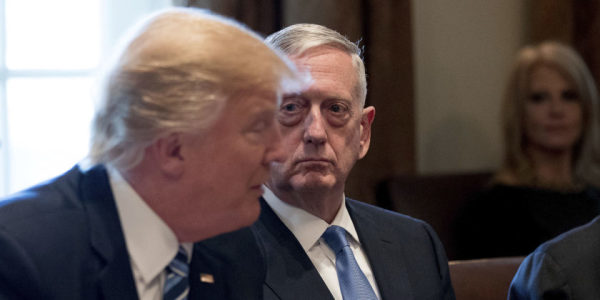

On Tuesday evening, Secretary of Defense James Mattis released a statement saying that transgender service members will be permitted to remain in the armed forces until a study can be conducted on “military readiness, lethality, and unit cohesion, with due regard for budgetary constraints and consistent with applicable law.”
Prior to President Donald Trump’s July 26 “policy-by-tweet,” announcing that the U.S. government would not longer allow “transgender individuals to serve in any capacity in the U.S. Military,” the Department of Defense was in the middle of reviewing how it would integrate transgender service members and recruits. In 2016, then-Secretary Ash Carter officially lifted the ban on transgender service members in the military under the Obama administration, giving service chiefs until July 2017 to develop guidelines for accessions of transgender individuals. Trump’s declaration at the end of the month caught the Pentagon by surprise, but has slowly been reeled in under the direction on Mattis and the Joint Chiefs of Staff.
It is unclear whether the military will allow transgender individuals to enter the services during this review period; although, according to his statement, it seems Mattis’ freeze on the transgender ban only applies to currently serving military members.
Read his full statement below:
The Department of Defense has received the Presidential Memorandum, dated August 25, 2017, entitled “Military Service by Transgender Individuals.” The department will carry out the president’s policy direction, in consultation with the Department of Homeland Security. As directed, we will develop a study and implementation plan, which will contain the steps that will promote military readiness, lethality, and unit cohesion, with due regard for budgetary constraints and consistent with applicable law. The soon arriving senior civilian leadership of DOD will play an important role in this effort. The implementation plan will address accessions of transgender individuals and transgender individuals currently serving in the United States military.
Our focus must always be on what is best for the military’s combat effectiveness leading to victory on the battlefield. To that end, I will establish a panel of experts serving within the Departments of Defense and Homeland Security to provide advice and recommendations on the implementation of the president’s direction. Panel members will bring mature experience, most notably in combat and deployed operations, and seasoned judgment to this task. The panel will assemble and thoroughly analyze all pertinent data, quantifiable and non-quantifiable. Further information on the panel will be forthcoming.
Once the panel reports its recommendations and following my consultation with the secretary of Homeland Security, I will provide my advice to the president concerning implementation of his policy direction. In the interim, current policy with respect to currently serving members will remain in place. I expect to issue interim guidance to the force concerning the president’s direction, including any necessary interim adjustments to procedures, to ensure the continued combat readiness of the force until our final policy on this subject is issued.